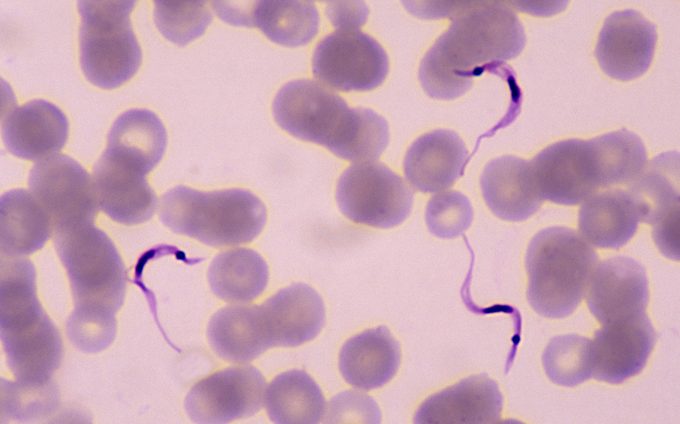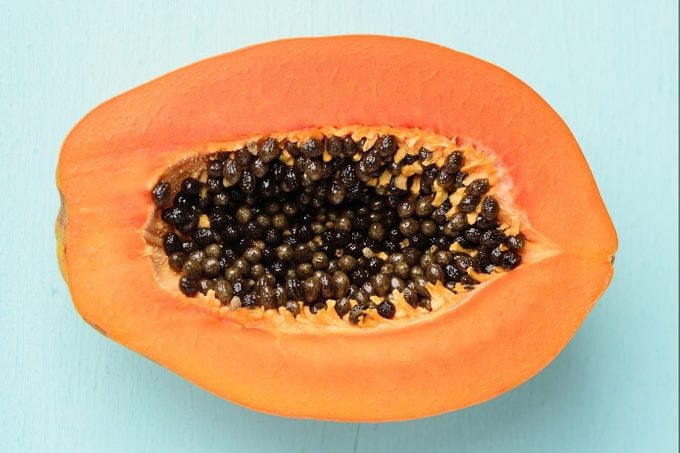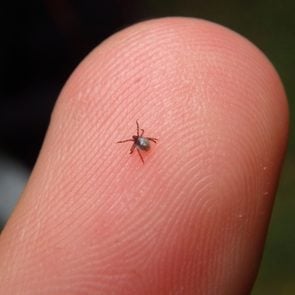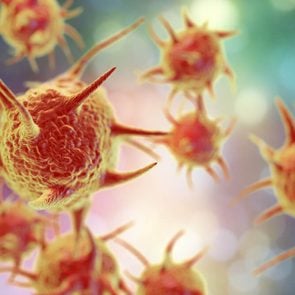What’s a Parasite Cleanse? Health Pros Share Their Takes on This Trend
Updated: Jul. 06, 2022
The "parasite cleanse" for your G.I. system has gotten popular on TikTok. This homeopathic detox promises to get rid of unwanted guests in your digestive system—but is it safe? Four health experts, including a Cleveland Clinic gastroenterologist, sound off.
A “parasite cleanse” is a TikTok fad that calls for discussion
Restaurant menus often remind you in fine print that eating raw or undercooked food can lead to illness. Unfortunately, that risk may be on the rise: According to a 2020 study at the University of Washington, the abundance of a particular worm from raw or undercooked seafood has increased nearly 300 times since the late 1970s.
You’ve most likely heard that a healthy gut microbiome is a good thing, but parasites—which affect “millions of Americans,” a 2014 CDC study suggested—can throw your digestive system, or your overall health, for a loop.
When parasites set up camp in your gut or elsewhere, some have the potential to cause unpleasant and potentially dangerous symptoms. On the other hand, some experts have suggested that symptoms you have a parasite may be barely noticeable or even nonexistent, depending on the type of parasite and other factors.
What are some parasite infection symptoms?
New York City registered dietitian Robin Foroutan has been suggesting parasite cleanses to clients for years, explaining that your gut microbiome contains a delicate balance of good and bad microorganisms, including bacteria, fungi, parasites, and viruses. Foroutan says all of these work together to promote health and wellbeing.
“Most people have parasites in their gastrointestinal tract, and that’s OK,” Foroutan reveals. “Some of them are actually friendly and not causing any harm, but when they run amok and crowd out beneficial microbes and disrupt your gut barrier and function, they can be problematic.”
Parasite symptoms run the gamut, ranging from stomach pain, nausea, and vomiting to fever, seizures, aches, pains, and unintended weight changes. One red flag she’s heard from clients, Foroutan says, is an itchy bottom. “If someone comes in with anal itching, even if it comes and goes, they should be evaluated for pinworms.”
She adds that other symptoms of parasitic infection can be more nuanced, such as unintended weight gain or loss, persistent bloating in your lower abdomen, teeth grinding, or a slew of new food allergies or sensitivities that come on seemingly out of nowhere.
Foroutan points out that these symptoms can also be caused by other health conditions. For example, constipation that should be ruled out before looking to a parasite cleanse.
A fuller list of symptoms of parasite infections may include:
Rashes
Unintended weight loss or gain
Itching
Abdominal pain
Diarrhea
Vomiting
Aches and pains
Allergies
Flu-like symptoms
Your healthcare provider will review your symptoms and history, including any recent travel, as some parasites are more common in other countries. They may also order blood, stool, or imaging tests if they find reason to believe you may have a parasite.
Getting treated for a diagnosed parasitic infection is different than embarking on a parasite cleanse. These infections are typically treated with prescription anti-parasitic medications such as the FDA-approved antiparasitic drug ivermectin.
The sudden “parasite cleanse” trend
Parasite cleanses—some which have exploded on TikTok—promise to get rid of possible parasites in your body and improve your symptoms using supplements and herbs. Taking the natural route to optimize your health or address apparent symptoms can be a great option. But does a homeopathic parasite cleanse work? Possibly not so much.
Experts are quick to caution that the only way to know if you have a parasite is through a thorough examination and often extensive testing. They add that proper treatment involves anti-parasitic medications as directed by your licensed healthcare provider.
What are the types of parasites?

A biology class refresher: Parasites are organisms that live on, or in, a host (which can be human or animal). A parasite can make its way into your body via contaminated food or water, infected bugs, sexual contact, or pets and other animals. Some parasites are tiny, one-cell organisms. Others are worm-like and visible in feces, without a microscope.
The Centers for Disease Control and Prevention (CDC) suggests there are three main classes of parasites that cause disease in humans. They are protozoa, helminths, and ectoparasites.
Protozoa—such as Giardia, Amoeba and Cryptosporidium Giardia—are transmitted through contaminated food, water, or stool, according to the CDC. They can cause diarrhea, stomach pain, or dehydration, among other symptoms.
Amoebae (plural for amoeba) can cause amebiasis, an infection of the intestines. Some insect-borne parasites such as babesiosis, one type that’s spread by ticks and mosquitoes, fall into this category. Amoebae could also appear in dirty water, on surfaces containing stool traces from an infected person, or in food or soil.
Helminths
These are parasitic worms, such as tapeworms, pinworms, roundworms, fluke, and flat worms, are transmissible through contaminated water or raw and undercooked meat. (This might beg the question: “Is it safe to drink tap water?”)
Ectoparasites
The CDC explains that ectoparasites, like lice or fleas live on, not in, your body.
What’s the best parasite cleanse?

Parasite cleanses use herbs and supplements to “de-worm” your body.
Some TikTok personalities have taken to papaya seed cleanses to get rid of parasites. There’s research to back this up, including a small study in the Journal of Medicinal Food that found that children in Nigeria with intestinal parasites who drank an elixir made of dried papaya seeds were more likely to clear their stool of parasites than a control group who ate honey.
However, the literature on papaya seed parasite cleanses is very sparse, says Christine Lee, MD, a gastroenterologist at Cleveland Clinic. These seeds aren’t necessarily risk-free either, she says. Papaya seeds can contain trace amounts of poisonous cyanide, and some animal studies have suggested they can impair fertility. “The most conservative advice is to avoid these cleanses,” Dr. Lee says.
Still, if you decide to try one, herbs and ingredients that may be used in a parasite cleanse include:
Wormwood
Artemesia
Berberine
Oregano oil
Black walnut
Clove
Diatomaceous earth
Grapefruit seed extract
Neem
Propolis
Oregon grape
Papaya seeds
Olive leaf
Certain herbs can rebalance the gut by flushing out the bad guys, Foroutan says. It takes some expert mixing and matching to find the right formula for each individual.
Why you shouldn’t try to rid your body of parasites on your own
Don’t try a parasite cleanse at home, dietitian Foroutan cautions.
Parasite cleanses are only OK under the careful guidance of an expert who can help you figure out the best plan for you, including the frequency, duration, and most appropriate herbs or medications for the cleanse, she says.
Parasite cleanse steps
Foroutan has developed her own cleanse protocols based on the results of testing and evaluation. “My choice of regimens depends on what kind of pathogens I suspect and how inflamed the gut is,” she says. Foroutan orders stool tests when she suspects a parasite. Unfortunately, she says, there is no perfect stool test that can spot all parasites in all comers. “Some are more sensitive than others,” she notes.
Each of Foroutan’s bespoke cleanses start with a prep period to get the body ready before initiating the killing protocol. Foroutan also prescribes detox binders, compounds that bind toxins and remove them from the gut.
If she suspects an amoeba as the culprit, berberine is her go-to. There’s some research suggesting that berberine kills amoebae and can be used to treat Giardia infections. Berberine-containing herbs include barberry, Oregon grape, goldenseal, and goldthread.
These cleanses are not just about killing worms, she stresses. “It’s about restoring balance in the digestive tract and making sure gut immune system is in good shape to prevent an overrun of potent pathogenic microbes.”
The length of the cleanse depends on how long the infection has been present. “If you had some bad sushi a few nights ago, and we hit you with herbs and/or a prescription, everything goes back to normal relatively quickly,” she notes. If the infection has been lingering for a while, treatment may take longer, she says. Foroutan often works with infectious disease doctors or gastroenterologists to incorporate prescription or over-the counter anti-parasitic medications as part of the cleanse, when warranted.
Parasite cleanse risks and safety concerns
Many herbs and supplements touted for helping to get rid of the parasite may confer their fair share of risks, especially in high doses, Dr. Lee says. “A lot of these go through your kidney and liver for clearance, and you can have an unwanted adverse reaction and develop liver or kidney damage.”
If you think you have a parasite, see your doctor, Dr. Lee stresses, advising that doctor-administered diagnostics are the best way to figure out what’s going on. “We have very good stool studies that can confirm and verify that you actually have a parasite infection, and there are U.S. Food and Drug Administration-approved medications that are safe and effective,” she says.
What to do if you think there’s a worm in your stool
Seeing isn’t necessarily believing, Dr. Lee says. If you think you see a worm in your stool, it may not be a parasite at all. “Bean sprouts, spaghetti squash, and other stringy vegetables are not fully absorbed can be passed in your stool where they may look like a parasite,” she points out.
You should still seek medical attention before attempting to treat a possible parasite on your own. “A misdiagnosis can have harm, as you are not treating the real issue if you think it’s parasite,” she says.
“The stakes are high because when a person becomes convinced that they have a parasite, they then start down a path where they will attempt to sterilize their gut with some variety of treatments,” agrees Will Bulsiewicz, MD, a gastroenterologist in Mount Pleasant, South Carolina.
A parasite cleanse may harm the gut microbiome, he says, adding that many people who believe they have a parasite infection may instead be experiencing consequences of gut dysbiosis, an imbalance of bacteria in the colon.
The last thing that you want to do is cause further injury to the microbes. “By destroying the bacteria, the dysbiosis is likely to get worse,” Bulsiewicz says.
Parasite prevention tips
Of course, the best strategy is never to get a parasite in the first place. Parasite prevention includes:
Washing your hands before eating or preparing food and after touching soil or using the toilet.
Drinking only bottled or boiled water in high-risk areas
De-worming your pets
Always thoroughly cooking your food
Not swallowing water from lakes, streams, or ponds
Steering clear of cat litter when you’re pregnant
If you’re invested in good gut health, you’ll love this news about bananas. And if you’re looking to upgrade your health in general this year, don’t miss 10 Easy Self-Care Swaps to Make in 2022.


















